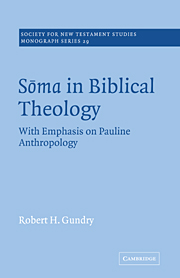Book contents
- Frontmatter
- Contents
- Acknowledgements
- Abbreviations
- PART I FOR AND AGAINST A HOLISTIC DEFINITION OF SŌMA
- PART II SŌMA IN THE FRAMEWORK OF ANTHROPOLOGICAL DUALITY
- PART III THE THEOLOGY OF SŌMA AS PHYSICAL BODY
- 13 The sōma in death and resurrection
- 14 Sōma and the being of man
- 15 Sōma, sin, and salvation
- 16 Sōma, individuality, and solidarity
- 17 Sōma and the Church as the Body of Christ
- Select bibliography
- Index of passages cited
- Index of authors
14 - Sōma and the being of man
Published online by Cambridge University Press: 14 January 2010
- Frontmatter
- Contents
- Acknowledgements
- Abbreviations
- PART I FOR AND AGAINST A HOLISTIC DEFINITION OF SŌMA
- PART II SŌMA IN THE FRAMEWORK OF ANTHROPOLOGICAL DUALITY
- PART III THE THEOLOGY OF SŌMA AS PHYSICAL BODY
- 13 The sōma in death and resurrection
- 14 Sōma and the being of man
- 15 Sōma, sin, and salvation
- 16 Sōma, individuality, and solidarity
- 17 Sōma and the Church as the Body of Christ
- Select bibliography
- Index of passages cited
- Index of authors
Summary
‘What is the specific respect in which man is regarded when he is called soma?’ That is an important question the proper answer to which will give us positive results in building a truly Biblical anthropology. Bultmann answers this, his own question, ‘Man is called soma in respect to his being able to make himself the object of his own action or to experience himself as the subject to whom something happens.’ He goes on to use phrases such as ‘having a relationship to himself’, ‘to distinguish himself from himself’, ‘the object of his own conduct’ over against himself ‘as subject’ [of his own conduct] or the object of ‘an occurrence that springs from a will other than his own’.
Here it is important to observe the tension between sōma as the whole self and sōma as the object-‘half’ as opposed to the subject-‘half’ of the self. Constitutionally, sōma denotes the ‘whole’ self. Functionally, sōma denotes the object-‘half’ of the self. ‘Half’ must be put in quotation marks, however, because Bultmann is really putting the ‘whole’ self as object opposite the ‘whole’ self as subject. What then does the term ‘whole’ mean? It, too, must be put in quotation marks. But this only points up the paradox caused by the use of adjectives (‘whole’ and ‘half’) proper to substances in dealing with categories which are not substantival, or ontological, but functional – or more specifically, existential.
- Type
- Chapter
- Information
- Soma in Biblical TheologyWith Emphasis on Pauline Anthropology, pp. 184 - 203Publisher: Cambridge University PressPrint publication year: 1976

